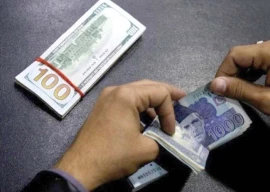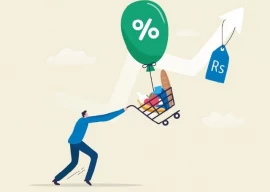The government’s plan to discourage usage of compressed natural gas in private cars has been well received by analysts who believe it will be a right decision, if taken, as there are other critically important areas that are more desperate for the commodity.
Petroleum and Natural Resources Minister Dr Asim Hussain has expressed his intention to send a summary to the cabinet, seeking steps to discourage CNG consumption in private cars while encouraging its usage in public transport vehicles.
JS Global Capital auto sector analyst Atif Zafar told The Express Tribune that the proposal to discourage CNG usage in private cars would be welcomed for a variety of reasons.
First, there is a scarcity of gas with the need to divert the commodity to other sectors like industry that use gas efficiently. Second, private car owners can afford other fuels. However, he suggested that the government must come up with some alternative for private cars before taking any such step. He himself pointed to an alternative, which was liquefied petroleum gas (LPG) that costs more than CNG but less than petrol and diesel. “The government will have to give some incentive to private car owners to switch to LPG,” he said.
In the past, LPG had never been marketed well because of which its consumption was only limited to taxis and rickshaws, he said, adding proper marketing would increase its allure as an alternative to CNG.
“The government is also right in planning to facilitate public transport vehicles because the poor, who travel through buses and wagons, are the ones who deserve the cheaper fuel the most,” he said.
Zafar did not agree that the move would adversely affect car manufacturers and vehicle sales, saying it may somewhat reduce sales of small cars. CNG accounts for only eight per cent of total gas consumption in the country, but analysts say its demand has increased phenomenally over the last few years.
Standard Capital Securities Research Head Faisal Shaji said the government-supported mushroom growth of CNG consumption was a wrong policy because it caused more harm than good. He said CNG station owners continuously got licences through political manoeuvres and now the country was facing acute shortage of gas with the upper middle class benefiting from this cheap fuel. “The country could not find any alternative to Sui gas fields. With low investments in oil and gas sector, we need to change our energy mix and save gas, which is now a scarce commodity,” he said.
Like many other cities, many public transport vehicles in Karachi have been converted to CNG but transporters are still charging the same fares that they used to get on expensive diesel.
Even if the government slaps a ban on CNG kits in new cars, it will have to go a long way to ensure that the benefits of cheap fuel trickle down to poor people.
Published in The Express Tribune, November 19th, 2011.
1719315628-0/BeFunky-collage-(8)1719315628-0-405x300.webp)


1731329418-0/BeFunky-collage-(39)1731329418-0-165x106.webp)













COMMENTS
Comments are moderated and generally will be posted if they are on-topic and not abusive.
For more information, please see our Comments FAQ